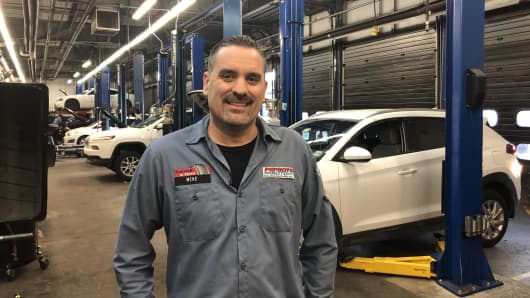Across the country there are more drivers on the road, and many of them hanging on to their vehicles longer than ever. That means workers like Michael Gerhart are in demand.
Gerhart, a master auto technician at Pep Boys, has been fixing cars for nearly three decades, keeping on top of his skills as technology advances and learning how to do his job in a new way. Today, his focus is on engine diagnostic work, including things like the driveability of vehicles and emissions testing for the state of New Jersey. He works on different vehicles throughout the day, flexing his knowledge base on makes and models of all kinds.
"Cars have changed a lot, even in the past 10 years as far as the diagnostic end of things, and training has become more advanced as far as what's required to fix the current vehicles," Gerhart said. "It definitely doesn't get boring and it's always changing."
Some 46,000 automotive service technicians and mechanics will be needed to fill roles through 2026, according to the Bureau of Labor Statistics, at a time when the skills gap and worker shortage is particularly acute for blue-collar jobs. As economic growth is expected to continue in 2019, so too is a labor shortage both blue-collar and low-paying services occupations, a recent study from The Conference Board found. Baby boomers are aging out of the workforce at the same time the pool of available labor has become more educated, and thus less interested in blue-collar jobs.





